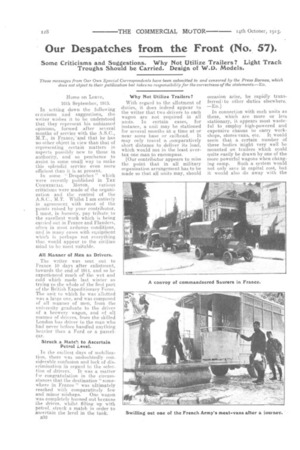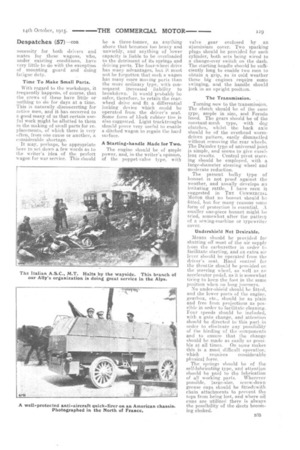Our Despatches from the Front (No. 57).
Page 8

Page 9

If you've noticed an error in this article please click here to report it so we can fix it.
Some Criticisms and Suggestions. Why Not Utilize Trailers ? Light Track Troughs Should be Carried. Design of W.D. Models.
These messages from Our Chvrt Special Correspondents have been submitted to and censored by the Press Bureau, which does not object to their publication but takes no responsibility for the correctness of the statements.—En.
Home on Leave, 16th September, -1915.
In setting down the following criticisms and suggestions, the writer wishes it to be understood that they represent his unbiassed opinions, formed after several months of service with the 11.S.C., M.T., in France; sand that he has no other object in view than that of representing certain matters in aspects possibly new to those in. authority, and so perchance to assist in some small way to make this splendid service even more efficient than it is at present.
In some " Despatches " which were recently published in THE COMMERCIAL Moron, various criticisms were made of the organization and the control of the A.S.C., KT. Whilst I am entirely in agreement with most of the points raised by your contributor, I must, in honesty, pay tribute to the excellent work which is being carried out in France and Flanders, often in most arduous conditions, and in many cases with equipment which is perhaps not everything that would appear to the civilian mind to be most suitable.
All Manner of Men as Drivers.
The writer was sent out to France 10 days.. after enlistment, towards the end of 1914, and so he experienced much of the wet and cold which made last winter so trying to the whole of the fi.rst part of the British Expeditionary Force. The unit to which he was allotted was a large one, and was composed of all manner of men, from the university graduate to the driver of a brewery wagon, and of all manner of drivers, from, the skilled London bus driver to the man who had never before handled anything heavier than a Ford or a parcelCar.
Struck, 4 1Vlatth to Ascertain Petrol Level.
Tn the earliest days. of mobilization, there was undoubtedly considerable confusion and lack of discrimination in regard to the selec tion of drivers: It was a matter fr)r congratulation in the circumstances that the destination " somewhere in France " was ultimately reached with comparatively few
and minor -Mishaps. One wagon was completely burned out because the driver, whilst filling up with petrol, struck a...match in order to ascertain the level in the tank.
n:30 Why Not Utilize Trailers?
With regard to the allotment of duties, it does indeed appear to the writer that two drivers to each wagon are not required in all units. In certain cases, for instance, a unit may be stationed for several months at a time at or near some base or railhead. It may only travel a comparatively short distance to deliver its load, which would not in the least overtax one man to encompass.
[Our contributor appears to miss the point that in all military organization arrangement has to be made so that all units may, should occasion arise, be rapidly transferred U to other duties elsewhere. —En.] In conneetion with such units as these, which are more or less stationary, it appears most wasteful to employ high-powered and expensive chassis to carry work shops, stores-vans, etc. It. would seem that a certain number of these bodies Might very well be mounted on trailers which could quite easily be drawn by one of the more powerful wagons when changing camp. Such a system would not only save in capital cost, but it would also do away with the necessity for both drivers and mates for these wagons, who, under existing conditions, have very little to do with the exception of mounting guard and doing fatigue duty.
Time To Make Small Parts.
With regard to the workshops, it frequently happens, of course, that the crews of these have little or nothing to do for days at a time. This is naturally disconcerting for active men, and it has occurred to a good many of us that certain useful work might be allotted to them in the making of small parts for replacements, of which there is very often, from one cause or another, a considerable shortage.
It may, perhaps, be appropriate here to set down a, few words as to the writer's idea of the perfect wagon for war service. This should
be a three-tonner, as anything above that becomes too heavy and unwieldy, and anything of lower capacity is liable to be overloaded to the detriment of its springs and driving parts. The four-wheel drive has many advantages,but it must not be forgotten that such a wagon has many more moving parts than the more ordinary type, with consequent increased liability to breakdown.' it would probably he safer, therefore, to retain the rearwhee.1 drive and fit a differential locking device which could be operated from the driver's seat. Some form of block rubber tire is also suggested. Light tracktroughs should prove very useful to enable a ditched wagon to regain the hard surface.
A Starting-handle Made for Two.
The engine should be of ample power, and, in the writer's opinion, of the poppet-valve type, with valve gear enclosed by an aluminium cover. Two sparking plugs should be provided for each cylinder, both sets being wired to a change-over switch on the dash. The starting handle should be sufficiently long to enable two men to obtain a grip, as in cold weather these big engines require some swinging, and the handle should lock in an upright position.
The Transmission.
• Turning now to the transmission. The clutch should be of the cone type, ample in.. size, . and Ferodo lined. The gears should be of the constant-mesh type, • • with dog clutches, whilst the back axle should be of the overhead wormdriven pattern, easily dismantled without removing the rear wheels. The Daimler type of universal joint is simple, and seems to give excel lent results. Central pivot steering should be employed, with a large-diameter steering wheel and moderate reduction.
The present bulky type of bonnet is not proof against the weather, and usually develops an irritating rattle. I have seen it suggested in THE COMMERCIAL MOTOR that no bonnet should be fitted, but for many reasons some form of protection is essential. A smaller one-piece bonnet might be tried, somewhat after the pattetu of a sewing-machine or typewritee cover.
Undershield Net Desirable.
Means should be provided for shutting off most of the air supply from the carburetter in order to facilitate starting, and an extra air lever should be operated from the driver's seat. Hand control for the throttle should be provided on the steering wheel, as well as an accelerator pedal, as it is somewhat tiring to keep the foot in the same vosition when on long journeys.
No under-shield should he fitted, and the lower parts of the engine, gearbox, etc., should be as plain and free from projections as possible in order to facilitate cleaning. Four speeds should he included, with a gate change, and attention should-be directed to 'this part -in order to eliminate any possibility of the binding of the 'components and to ensure that the change should be made as easily as possible at all times. On some makes this is a most difficult operation, which requirea considerable physical force..
The Springs should be of the self-lubricating type, and -attention should be paid to the lubrication of all working parts. Wherever possible, large-size, screw-down grease cups should be fittedwith chain attachments to prevent the tops from being lost, and where oil cups are utilized there is always the possibility of the ducts becoming choked.




















